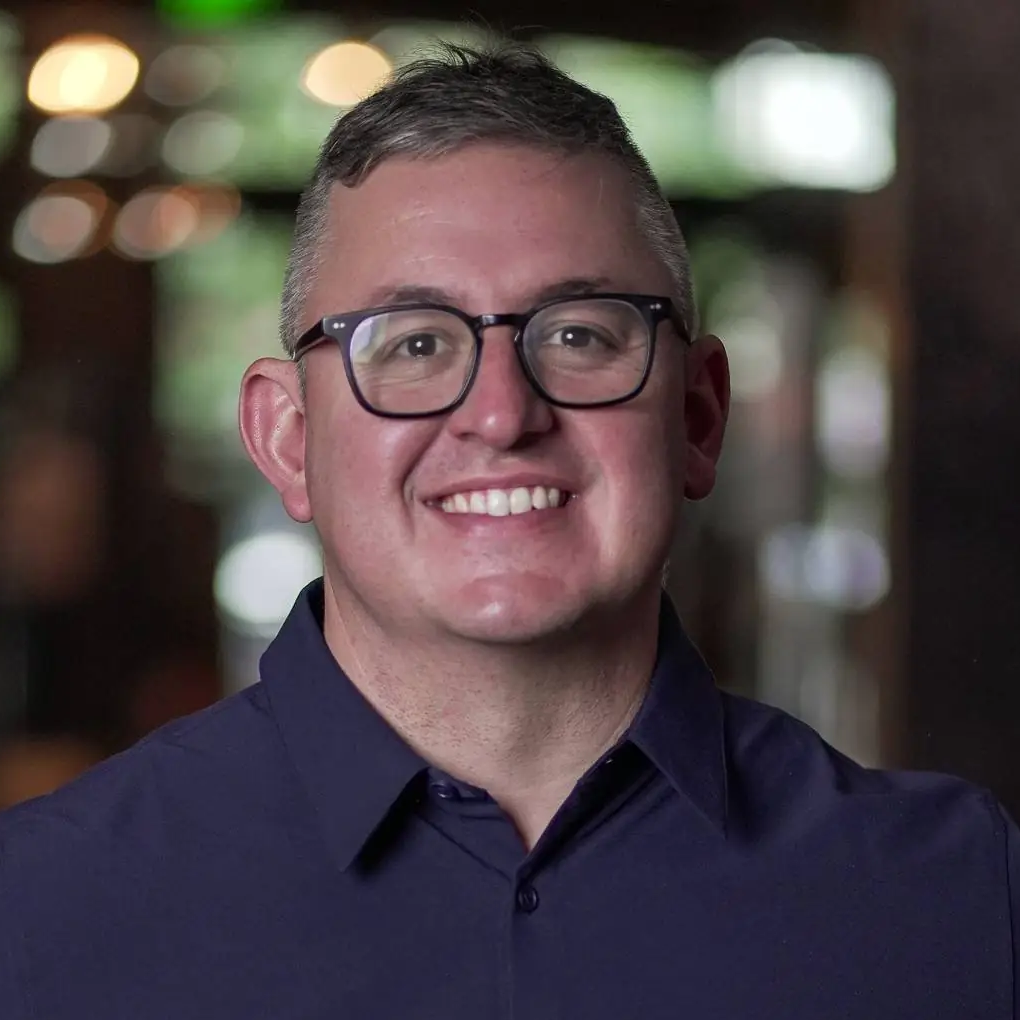As a personal injury attorney, you know the law inside and out. You’re an expert at representing your clients and fighting for their rights. But when it comes to marketing your firm? Well, that’s a whole different courtroom.
If you’re feeling lost in the world of digital marketing, pay-per-click (PPC) advertising, and search engine optimization (SEO), you’re not alone.
Many personal injury lawyers find themselves struggling to stand out in an increasingly crowded and competitive field where big marketing budgets stand out.
That’s why we’ve put together this comprehensive list of 43 unique personal injury marketing ideas.
Whether you’re a solo practitioner or part of a larger firm, these strategies can help you attract more cases and grow your personal injury practice.
From leveraging social media to hosting community events, we’ll cover a wide range of tactics that go beyond the typical “advertise on billboards” advice. And don’t worry – we’ll break down any marketing jargon along the way, so you can focus on what really matters: helping accident victims get the justice they deserve.
So, put down that case file for a moment and let’s dive into some fresh, effective ways to market your personal injury law firm. Who knows? Your next big personal injury case might come from an idea you find right here.
After all, one of our clients used our email newsletter tips to sign a serious injury case that resulted in a $6 Million Dollar Settlement.
Please note that the following ideas are in no particular order, although I did pick #1 specifically for a reason 😊 It all starts here.
1. Optimize All Of Your Firms Your Marketing (And Website) with Client-Focused Messaging Using Storybrand
I’m just going to come out and say it. Most SEO fails for attorneys because their messaging is atrocious.
Your website isn’t just a digital brochure—it’s your virtual law office where potential clients come to seek help during one of the most challenging times in their lives.
While technical aspects like speed and mobile-friendliness are important, the messaging on your site is what truly connects with injured individuals and their families.
Most accident attorney websites use generic messages because they saw it on a competitor website. This results in headlines like this:
“Dallas Personal Injury Lawyer: 99% Success Rate”
vs.
Injured in a Dallas Accident? We Guide You Through Every Step to Get the Compensation You Deserve—Stress-Free Help When You Need It Most
At Juris Digital all of our team members are Storybrand trained. Storybrand is not made to attract YOU as the client, but rather your ideal clients. So after some interviews with ideal clients, we come up with the key components. These are:
- Client as the Hero: Your website should immediately speak to the client’s experience. Instead of boasting about your firm’s accolades, address the client’s pain points directly.
- Clear Problem Statement: Articulate the external, internal, and philosophical problems your clients face. For example: “Injured in an accident? You’re likely facing medical bills (external), feeling overwhelmed (internal), and believe it’s unfair that you should suffer due to someone else’s negligence (philosophical).”
- Position Your Firm as the Guide: Show empathy and authority. Demonstrate that you understand what they’re going through and have the expertise to help.
- Provide a Clear Plan: Outline the steps a client will take when working with your firm. This reduces uncertainty and builds trust.
- Strong Calls-to-Action (CTAs): Use action-oriented language that prompts potential clients to take the next step in their journey.
- Show What’s at Stake: Clearly communicate the risks of not seeking legal help, such as missing out on rightful compensation.
- Paint a Picture of Success: Use testimonials and case studies to show how your firm has helped others achieve justice and rebuild their lives.
A Practical Example in Action:
I love practical examples to help learn, so here is one.
Let’s look at how a personal injury law firm like Morgan & Morgan might optimize their website using the StoryBrand framework:
- Hero-Focused Homepage: Instead of “We’re America’s Largest Injury Law Firm,” their headline might read: “Injured and Overwhelmed? We’ll Guide You to the Compensation You Deserve.”
- Empathetic Problem Statement: “After an accident, you’re left with more than just physical pain. Medical bills are piling up, you can’t work, and insurance companies aren’t playing fair. It’s not right, and you shouldn’t have to face this alone.”
- Firm as the Guide: “For decades, we’ve helped thousands of injured individuals just like you navigate the complex legal system and get their lives back on track. We understand what you’re going through, and we have the expertise to help.”
- Clear Plan:
- Free Case Evaluation
- We Investigate Your Case
- We Negotiate with Insurance Companies
- We Fight for You in Court (if necessary)
- You Receive the Compensation You Deserve
- Compelling CTAs: “Get Your Free Case Evaluation Now” or “Speak with a Caring Attorney Today”
- Stakes and Success: “Don’t risk losing out on the compensation you need to recover. Our clients have received X times more compensation with our help than those who tried to handle claims on their own. Let us help you get back on your feet and move forward with your life.”
Remember, in the StoryBrand framework, your website isn’t just about showcasing your firm—it’s about inviting potential clients into a story where they’re the hero, and you’re the trusted guide who will lead them to justice and healing.
By optimizing your website with this client-focused messaging, you’re not just improving your online presence—you’re creating a powerful tool that truly resonates with those who need your help the most.
2. Get Involved in the Community & Build Awareness
Community involvement is more than just good PR—it’s about building genuine connections and trust with the people you serve.
For personal injury lawyers, it’s an opportunity to show that you care about more than just winning cases; you care about the wellbeing of your community. And you will get free exposure, brand recognition, and goodwill from this.
Sponsor Local Events
Look for opportunities to sponsor local sports teams, cultural festivals, or charity runs. This not only gets your name out there but associates your firm with positive community experiences.
We still use this tactic as a great way to stay top of mind with people in our clients communities.
Participate in Charity Drives
Organize or participate in charity events that align with your firm’s values. This could be anything from a food drive to a fundraiser for a local hospital.
Offer Pro Bono Services
Dedicate a portion of your time to providing free legal advice to those in need. This demonstrates your commitment to justice beyond just paying clients.
Host Educational Workshops
Organize free workshops on topics like “Understanding Your Rights After an Accident” or “Navigating Insurance Claims.” This positions your firm as a valuable community resource.
Example in Action
Our client GJEL Accident Attorneys in the San Francisco Bay Area demonstrates community involvement through their innovative “Safe and Sober Free Cab Ride Program” during Halloween. This initiative offers free cab rides to residents in their service area, promoting safety and preventing drunk driving on a night known for increased alcohol consumption.
By funding this program, GJEL shows they’re not just focused on handling accident cases, but actively working to prevent them. This aligns perfectly with their mission as personal injury attorneys and positions them as a firm that truly cares about community safety.
This kind of community-focused initiative goes beyond mere visibility. It creates goodwill, demonstrates the firm’s values in action, and potentially saves lives. When community members see GJEL taking concrete steps to keep their neighborhoods safe, they’re more likely to view the firm as a trusted local ally rather than just another law practice.
3. Launch a Short Form Video Series
Short-form video content has become a powerful tool for engaging potential clients and establishing your expertise.
Platforms like YouTube Shorts and TikTok offer personal injury attorneys an opportunity to connect with their audience in a quick, digestible format.
Leverage YouTube Shorts and TikTok
These platforms are perfect for creating bite-sized legal tips, answering common questions, and humanizing your firm. With their algorithmic reach, your content can potentially go viral, exposing your firm to a broader audience.
@casey_meraz 👀 Just one reason our legal marketing is different than the “other guys”
♬ original sound – casey_meraz
Keep It Short and Sweet
Aim for videos under 60 seconds. This constraint forces you to distill complex legal concepts into clear, concise explanations that viewers can easily understand and remember.
Consistency is Key
Regularly posting content helps build an audience and keeps your firm top-of-mind for potential clients.
Showcase Your Personality
Short-form videos allow you to inject personality into your content, making your firm more relatable and approachable.
Example in Action
We have embraced this strategy, regularly posting short-form videos on platforms like YouTube Shorts and TikTok.
These videos, which cover various aspects of digital marketing for law firms, consistently garner thousands of views each week. This approach not only establishes Juris Digital’s expertise but also helps build a connection with potential clients.
Similarly, The Levin Firm has successfully launched a series of educational videos on TikTok and Instagram.
Their content addresses common personal injury questions like “What to Do After a Car Accident,” effectively engaging potential clients where they spend their time online.
By adopting a short-form video strategy, personal injury attorneys can expand their reach, demonstrate their expertise, and connect with potential clients in a format that’s both engaging and easily consumable.
It’s an excellent way to stand out in a crowded legal market and build trust with your audience.
Take a look at one of my Youtube videos below. Don’t forget to like and subscribe as well 🙂
4. Build Relationships with Local Referral Partners
Some of your most valuable cases probably already come from strategic partnerships.
Let’s face it. Those referral cases… if you want them… they’re easy to sign. Referrals ALWAYS need to be apart of your accident law firms marketing whether you do SEO or other advertising as well.
By cultivating relationships with local medical professionals and other attorneys, you can create a steady stream of high-quality, easy-to-sign cases.
Focus on Medical Professionals
Chiropractors, physical therapists, and doctors often have direct contact with injury victims. Building strong relationships with these professionals can lead to a consistent flow of referrals.
Network with Other Attorneys
Lawyers in different practice areas may encounter personal injury cases that aren’t a good fit for their firm. Establishing yourself as their go-to referral partner can be mutually beneficial.
Educate Your Partners
Ensure your referral partners understand the types of cases you handle and the value you bring to clients. This helps them make appropriate referrals.
Offer Value in Return
Consider how you can benefit your referral partners. This might include referring non-injury cases to other attorneys or recommending trusted medical professionals to your clients.
5. Ask For Reviews from Every Client & Every Interaction
Online reviews are the new word-of-mouth. For personal injury attorneys, cultivating a strong collection of positive reviews can significantly impact your firm’s reputation and visibility. Here’s why and how you should prioritize asking for reviews from every client:
Build Trust Through Social Proof
Potential clients often rely on the experiences of others to make decisions. Positive reviews act as powerful social proof, building trust before a potential client even contacts your firm.
Which firm would you choose below?
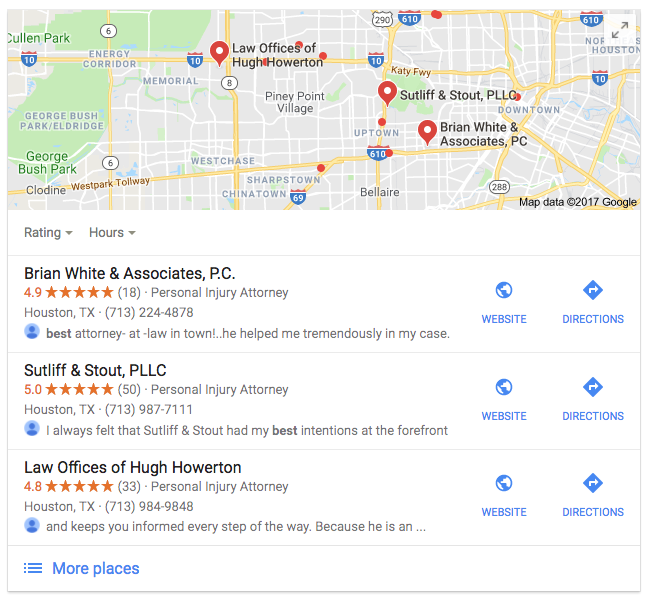
Boost Your Local SEO
Google considers the quantity and quality of reviews when determining local search rankings. More positive reviews can improve your visibility in local search results.
Improve Your Google Business Profile (GBP)
Reviews directly impact your Google Business Profile, which is often the first thing potential clients see when searching for a personal injury attorney in their area.
Create a Systematic Approach
Don’t leave reviews to chance. Implement a system to request reviews at key points in the client journey, such as after a successful settlement or at the conclusion of a case.
Make It Easy for Clients
The easier you make it for clients to leave reviews, the more likely they are to do so. Provide clear, simple instructions on how to leave a review on various platforms.
Respond to All Reviews
Whether positive or negative, responding to reviews shows that you value client feedback and are actively engaged with your clients.
Example in Action
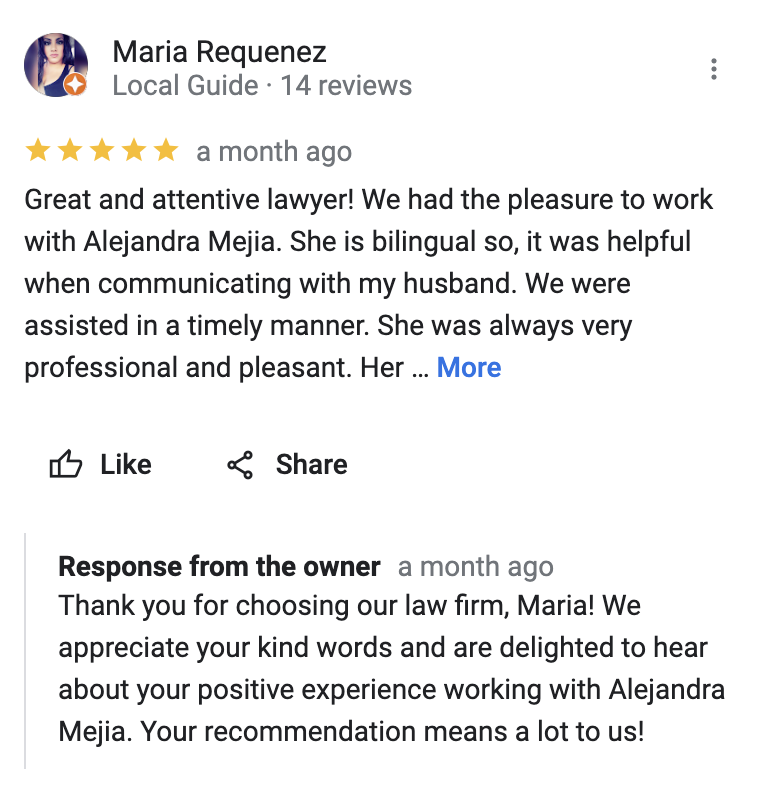
John Foy & Associates exemplifies best practices in review solicitation. They’ve created a dedicated page on their website with a step-by-step guide on how to leave a Google review. This guide includes:
- Clear, concise instructions
- Screenshots to visually guide clients through the process
- A direct link to their Google Business Profile
By making the review process as simple as possible, John Foy & Associates increases the likelihood that satisfied clients will take the time to share their experiences. This approach not only improves their online reputation but also boosts their local SEO performance.
Remember, every happy client is an opportunity to strengthen your online presence. By systematically asking for reviews and making the process easy, you can harness the power of client satisfaction to drive your firm’s growth and visibility. In the competitive field of personal injury law, a robust collection of positive reviews can be the differentiator that turns potential clients into actual clients.
6. Host a Live Event
Connecting directly with your community through live events can significantly boost your firm’s visibility and credibility. Whether in-person or virtual, these gatherings offer a unique opportunity to showcase your expertise and build trust with potential clients.
Use these events to address common legal concerns and share insights that genuinely help your audience. This positions your firm as a trusted resource and authority in personal injury law.
Choose Relevant Topics
Select topics that resonate with your target audience. This might include discussions on recent changes in personal injury law, tips for dealing with insurance companies, or explanations of the legal process for specific types of injuries.
Leverage Both In-Person and Virtual Formats
In-person events can create stronger personal connections, while virtual events offer broader reach and accessibility. Consider using both formats to maximize your impact.
Encourage Interaction
Allow time for Q&A sessions. This not only provides value to attendees but also gives you insight into the concerns and questions potential clients have.
Follow Up Effectively
Collect contact information from attendees and follow up with additional resources or information. This helps nurture relationships and can lead to future client acquisition.
Promote Your Events
Use your website, social media channels, and local partnerships to promote your events. Consider partnering with local organizations to expand your reach.
7. Implement Retargeting Ads
Retargeting ads are a powerful tool for personal injury law firms to stay connected with potential clients who’ve shown interest but haven’t yet taken action.
And while they are not as prominent as they use to be, they’re still relevant and great.
These ads follow users who’ve visited your website, displaying your firm’s message as they browse other sites, social media platforms, or conduct searches. This strategy keeps your firm top-of-mind during the critical decision-making period.
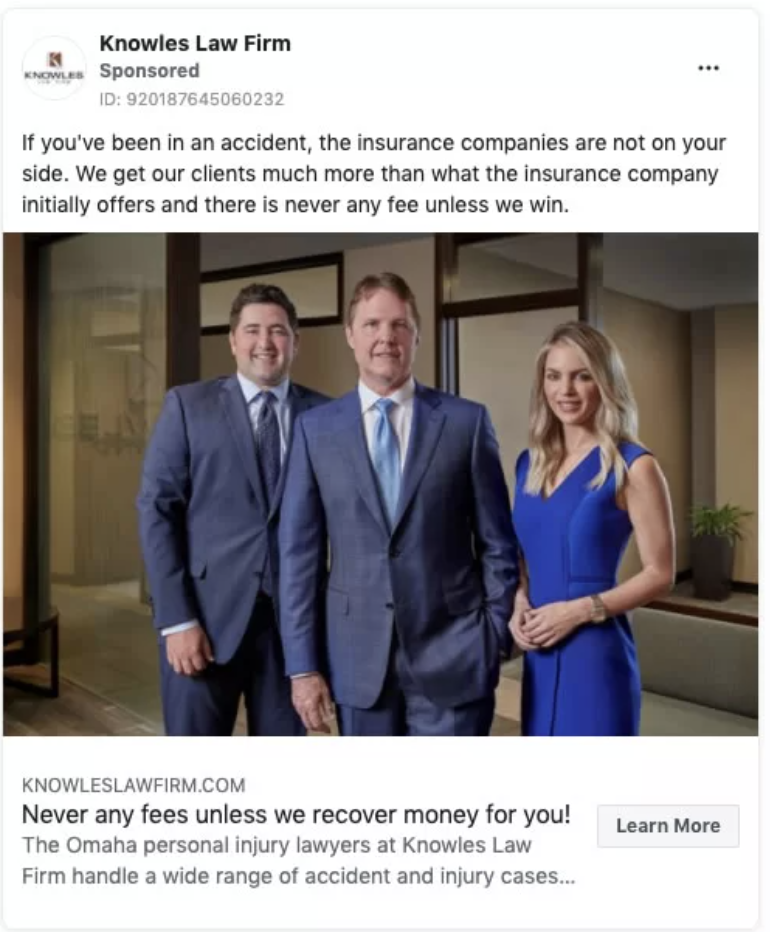
Nunez Law exemplifies the effective use of retargeting ads. They leverage both Facebook and Google platforms to re-engage website visitors who didn’t immediately contact the firm. Their ads might feature compelling messages about the firm’s expertise or offer free consultations, gently reminding potential clients of the legal help available.
This approach has led to a noticeable increase in case inquiries for Nunez Law, demonstrating the power of persistent, targeted messaging.
By implementing a similar strategy, your firm can capture leads that might otherwise be lost. Retargeting allows you to nurture potential clients over time, providing multiple touchpoints that can ultimately lead to conversion.
It’s a cost-effective way to maximize your marketing budget, focusing on an audience that has already shown interest in your services.
8. Collect Conversion-Worthy Data from Your Law Firm
Leveraging your firm’s success metrics can be a powerful tool for attracting new clients. By highlighting win rates, settlement amounts, and other impressive statistics, you create a compelling narrative of success.
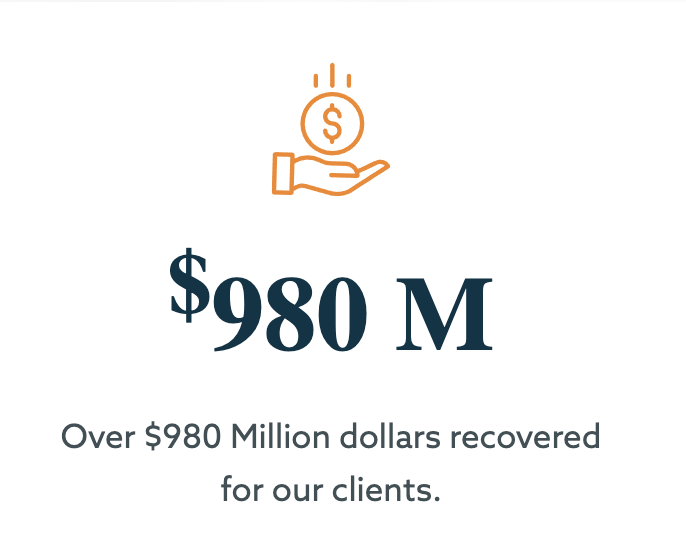
GJEL Accident Attorneys exemplifies this approach, prominently displaying “Over $1 billion recovered” and a “99% success rate” on their homepage.
These eye-catching figures immediately build trust and entice potential clients to reach out. By showcasing your firm’s track record, you’re not just telling potential clients you’re good—you’re showing them with hard data.
9. Speak at Local Bar Associations
Speaking engagements at bar associations can significantly enhance your reputation among peers and increase referral opportunities.

Brian Panish of Panish Shea & Boyle has mastered this strategy, frequently presenting at legal conferences and bar association meetings.
This positions him as a leading expert in personal injury law, not just to potential clients, but to other attorneys who may refer cases. These speaking opportunities allow you to showcase your expertise, share insights, and build valuable connections within the legal community.
10. Submit Your Attorneys for Major Awards
Winning or being nominated for prestigious legal awards builds credibility and trust with potential clients. The Davis Law Group effectively uses this strategy by prominently displaying their multiple Super Lawyers and Avvo awards on their website. These recognitions serve as third-party validation of your firm’s expertise and success.
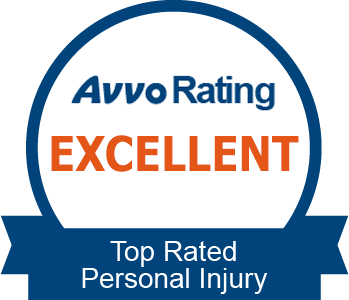
Common Legal Awards and Their True Value
- Avvo Ratings: While an Avvo 10.0 rating is widely recognized, it doesn’t necessarily indicate superior legal skills. It’s based on information provided by the lawyer and public sources. Read my guide on increasing your Avvo review here.
- Super Lawyers: Selected through peer nominations and evaluations. More rigorous, but can be influenced by in-firm nominations.
- Newsweek Top 10 Personal Injury Attorneys: It’s important to note that this is actually a paid placement, essentially a form of advertising.
- Best Lawyers in America: A peer-reviewed publication generally well-respected in the legal community.
- Martindale-Hubbell Peer Review Ratings: Based on peer reviews and considered reputable within the legal industry.
Why Pursue These Awards?
Despite their limitations, these awards are valuable for several reasons:
- Many potential clients don’t know the nuances behind these awards and find them impressive.
- Awards can provide a competitive advantage in a crowded market.
- They often come with SEO benefits through digital badges and backlinks.
- Awards provide excellent content for various marketing materials.
Best Practices for Leveraging Awards
- Be transparent about what the awards mean.
- Focus on awards specific to your market.
- Balance award showcases with other valuable content.
- Keep your award list current.
- Explain the significance of each award.
By incorporating these accolades into your marketing materials, you’re leveraging the power of social proof to attract and reassure potential clients. Remember, while you understand the intricacies of these awards, your potential clients may not know the difference. It’s best to pursue all relevant recognitions, especially those prominent in your market, to maximize your firm’s perceived credibility and expertise.
11. Create a Personal Injury Law Firm Marketing Plan
It’s surprising how many law firms jump straight into marketing tactics without having a clear, actionable marketing plan.
The issue here is that by chasing tactics—whether it’s SEO, pay-per-click, or social media—you end up hopping from one thing to another without understanding the bigger picture.
Instead, firms should start with a clear business goal, like growing by 3% month over month, or 30% annually.
Once that goal is set, break it down into real numbers: how many cases do you need to hit that target?
How many leads are required to get those cases? What’s your average cost per case?

By working backward from these numbers and using SMART goals (Specific, Measurable, Achievable, Relevant, and Time-bound), you’re able to implement a marketing strategy that is grounded in your firm’s business metrics.
This approach turns marketing from a series of disconnected tactics into a cohesive plan that delivers predictable, measurable growth.
12. Network at The Courthouse

Networking at your local courthouse, bar associations, or any place where your potential clients or colleagues gather is a powerful strategy, and it’s one I used to build my business early on. I took it a step further by hosting my own networking events, but before that, I simply started by meeting people face-to-face.
Here’s the thing: marketing isn’t just about tactics and online strategies. At its core, it’s about relationships. People do business with those they know, like, and trust. The challenge is that your services aren’t needed 24/7, and even if someone knows you, they may not think of you when the need arises.
That’s why staying in front of people consistently is key. It’s not just about making that first impression; it’s about keeping yourself top of mind. If you’re not doing this, you’re missing out on opportunities when those critical moments arise, and someone needs your services.
13. Local Business Partnerships and SMB’s Related to PI
One law firm I worked with came up with a unique and highly effective strategy: they partnered with other local businesses, specifically auto body shops.
The firm handled a lot of soft tissue injury cases, which often stemmed from car accidents, making auto body shops a natural fit for cross-promotion.
Here’s how it worked: whenever someone came into the auto body shop after an accident, the shop would refer them to the law firm if they mentioned any injuries, and in return, the law firm would recommend that shop to their clients who needed vehicle repairs.
It created a win-win situation. The auto body shops had an additional value to offer their customers—guidance toward legal help for potential injury claims—and the law firm got warm leads from people who were already in the early stages of needing legal services.
This kind of partnership goes beyond the traditional marketing tactics and taps into a more personal and community-based approach. It’s rooted in the idea that when someone experiences a car accident, their first stop is often the repair shop, not a lawyer’s office.
But… make sure to disclose any relationships you may have BEFORE doing this and be aware of ethics standards in your jurisdiction.

By creating a referral network, the law firm was able to position itself as the go-to resource at the right moment—when people needed legal assistance but hadn’t yet thought to seek it.
Cross-promotion like this also builds trust. When a business you already rely on recommends another service, it feels like a personal endorsement, increasing the likelihood that potential clients will reach out. Moreover, it keeps the law firm top of mind in the community. The constant exchange of referrals helped to establish the firm as a trusted name, both in the auto repair and legal spaces.
This approach can be replicated with other complementary businesses depending on your practice areas. For example, family law firms could partner with therapists or financial planners, and estate planning lawyers could collaborate with accountants. The key is finding local businesses that cater to the same audience but offer different, non-competing services.
14. Claim Your Google Business Profile (GBP)
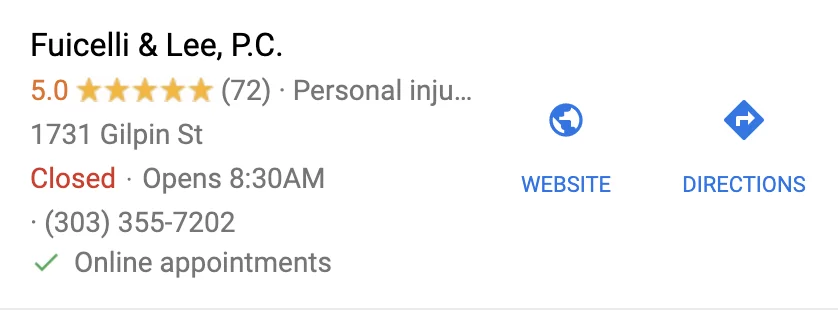
Optimizing your Google Business Profile is crucial for improving local visibility and helping potential clients find your firm quickly.
You can check out our full guide on this under our legal guides section.
PS: Don’t forget to set your primary category as Personal Injury Attorney.
15. Use SEM Ads (Search Engine Marketing)

Search Engine Marketing, particularly Pay-Per-Click (PPC) ads, can provide immediate visibility for high-intent keywords.
The most common mistake I see with people getting into PPC is not committing to it. It’s a marketing budget and you need time to measure results. Budget for six months and track your data to ensure the investment is worth the ROI. Even with costs rising we find that a great PPC strategy will help you firm sign more higher value cases at the right price.
Munley Law has successfully leveraged this strategy by investing in Google Ads targeting valuable terms like “truck accident attorney.”
This approach generates high-quality leads by putting your firm in front of people actively searching for legal services. While SEM requires a financial investment, it can yield quick results and complement your long-term SEO efforts.
16. Use Local Services Ads (LSAs)
Local Services Ads on Google operate on a pay-per-lead model, meaning you only pay when a potential client contacts you through the ad.

17. Leverage Long-Form Video Marketing for In-Depth Personal Injury Content
While we’ve already discussed the benefits of short-form video marketing, long-form video content offers unique opportunities to showcase your expertise and provide comprehensive value to potential clients.
Here is an example I did for Family Law Attorneys (most of the information is the same for personal injury attorneys – but it makes the point of a good example with decent views).
Benefits of Long-Form Video Content
- In-Depth Explanations: Long-form videos allow you to dive deep into complex legal topics, providing thorough explanations that short videos can’t capture.
- Establish Authority: By offering detailed insights, you position yourself as a true expert in personal injury law.
- SEO Advantages: Longer videos often lead to increased watch time on your website, which can positively impact your search engine rankings.
- Repurposing Potential: Long-form videos can be broken down into multiple short-form pieces for social media use.
Effective Long-Form Video Strategies
- Educational Series: Create a series of 10-15 minute videos explaining different aspects of personal injury law. For example, Morgan & Morgan produces in-depth videos on topics like “Understanding Comparative Negligence in Personal Injury Cases.”
- Client Journey Walkthroughs: Develop 20-30 minute videos that walk potential clients through the entire legal process, from initial consultation to case resolution.
- Expert Interviews: Conduct interviews with medical professionals, accident reconstruction experts, or other attorneys in your firm. Riddle & Brantley often features such interviews in their 15-20 minute YouTube videos.
- Case Study Deep Dives: Present detailed case studies in 10-15 minute videos, explaining the complexities of notable cases your firm has handled.
- Live Q&A Sessions: Host monthly hour-long live streams where you answer viewer questions about personal injury law and your services.
Best Practices for Long-Form Video Marketing
- Optimize for Search: Use keyword-rich titles, descriptions, and tags to improve discoverability on platforms like YouTube.
- Create Engaging Thumbnails: Design eye-catching thumbnails that accurately represent your video content.
- Include Timestamps: For longer videos, add timestamps in the description to help viewers navigate to specific sections.
- Promote Across Channels: Share your long-form content across your website, email newsletters, and social media platforms.
- Encourage Engagement: Ask viewers to comment with questions or topics they’d like to see covered in future videos.
By incorporating long-form video into your marketing strategy, you can provide substantial value to potential clients while differentiating your firm from competitors who may only focus on shorter content. Remember, the key is to balance informativeness with engagement to keep viewers interested throughout the longer format.
18. Speak at Legal Conferences
Speaking at legal conferences is a powerful strategy for personal injury attorneys to establish themselves as experts and build a robust referral network. This one-to-many approach allows you to showcase your expertise to a large audience of potential referral sources.
Benefits of Conference Speaking
- Establish Expertise: Presenting at conferences positions you as an authority in your field, enhancing your credibility among peers and potential clients.
- Build Referral Networks: Audience members who see you as an expert are more likely to refer cases to you or seek your involvement in complex cases.
- Showcase Specializations: For attorneys who specialize in maximizing case values for specific practice areas (e.g., motorcycle accidents), speaking engagements offer a platform to highlight this expertise.
- Create Content: Your presentations can be repurposed into articles, videos, and social media content, extending the reach of your message.
Effective Speaking Strategies
- Choose Relevant Topics: Select topics that showcase your unique expertise. For example, if you specialize in motorcycle accidents, present on “Maximizing Compensation in Complex Motorcycle Injury Cases.”
- Provide Actionable Insights: Offer practical tips that other attorneys can apply to their practice. This adds value and increases the likelihood of future collaborations.
- Share Case Studies: Present anonymized case studies that demonstrate your ability to handle complex cases and maximize settlements.
- Engage with the Audience: Encourage questions and discussions. This interaction can lead to valuable connections and potential referrals.
- Offer to Collaborate: Express your willingness to consult on or co-counsel complex cases in your area of expertise.
Real-World Example
Consider the approach of attorney Jason Waechter, known as “The Motorcycle Lawyer.” By speaking at legal conferences about motorcycle accident cases, he has established himself as a go-to expert in this niche. Many general practice attorneys now refer motorcycle accident cases to him or seek his involvement in these specialized cases.
Best Practices for Conference Speaking
- Prepare Thoroughly: Develop a well-structured, engaging presentation with visual aids.
- Network Actively: Arrive early and stay after your presentation to connect with attendees.
- Provide Take-Away Materials: Offer handouts summarizing key points and including your contact information.
- Follow Up: Connect with attendees on LinkedIn and send personalized follow-up emails.
- Seek Feedback: Use feedback to improve future presentations and identify potential collaboration opportunities.
By leveraging speaking opportunities at legal conferences, you can efficiently build your reputation and referral network. This strategy is particularly effective for attorneys with specialized practice areas, as it allows you to showcase your unique expertise to a wide audience of potential referral sources.
19. Speak at Non-Legal Conferences and Community Events
While speaking at legal conferences is valuable, engaging with the broader community through non-legal events can be equally impactful for personal injury attorneys. This approach allows you to connect directly with potential clients and establish yourself as a community leader and advocate.
Benefits of Community Speaking Engagements
- Direct Client Connection: Reach potential clients in a non-legal, low-pressure environment.
- Community Leadership: Position yourself as a concerned citizen and expert, not just a lawyer seeking clients.
- Brand Awareness: Increase recognition of your firm in the local community.
- Networking Opportunities: Connect with other community leaders and potential referral sources.
- Media Coverage: Local events often attract media attention, providing additional exposure.
Effective Community Speaking Strategies
- Choose Relevant Events: Select events that align with common personal injury cases. For example, participate in bicycle safety drives if your firm handles many cycling accident cases.
- Offer Valuable Information: Provide practical safety tips and legal information that attendees can use immediately.
- Use Relatable Examples: Share anonymized case studies or statistics that resonate with the local community.
- Engage Interactively: Incorporate Q&A sessions or demonstrations to make your presentation more engaging.
- Provide Free Resources: Offer handouts with safety tips, legal rights information, and your contact details.
Real-World Example
Consider the approach of “Bike Law” attorney Ann Groninger. She regularly speaks at bicycle safety events, offering tips on safe cycling practices and explaining cyclists’ rights. This approach has established her as a go-to expert for bicycle accident cases in her community.
Types of Non-Legal Events to Consider
- Bicycle and pedestrian safety drives
- Local school assemblies on traffic safety
- Community health fairs
- Neighborhood association meetings
- Local business chamber events
- Senior citizen center presentations on fall prevention
Best Practices for Community Event Speaking
- Tailor Your Message: Adapt your content to the specific audience and event theme.
- Avoid Overt Marketing: Focus on providing value rather than promoting your services directly.
- Be Approachable: Use plain language and encourage questions from attendees.
- Collaborate with Organizers: Work with event organizers to ensure your content aligns with their goals.
- Follow Up: Connect with attendees and organizers after the event to build lasting relationships.
By speaking at community events, you can establish yourself as a trusted resource and advocate, enhancing your firm’s reputation and visibility. This approach not only helps attract potential clients but also positions you as a valuable community leader, which can lead to increased referrals and positive word-of-mouth marketing.
20. Write Helpful Content on Personal Injury Issues
Creating valuable content on personal injury topics is a powerful strategy for attracting potential clients and establishing your firm’s expertise.
By consistently publishing informative articles, guides, and blog posts, you can improve your search engine rankings while building trust with your audience.
For example, when I worked with the Reeves Law Group, we regularly produced content like “How to Maximize a Personal Injury Settlement” or “10 Steps to Take After a Slip and Fall Accident.”
These resources not only provide practical advice to readers but also demonstrate the firm’s knowledge and experience.
When creating content, focus on addressing common questions and concerns your potential clients might have.
Use clear, accessible language and provide actionable tips. By offering this valuable information freely, you position your firm as a helpful resource, increasing the likelihood that readers will turn to you when they need legal assistance.
You can write these on your blog or other websites that get more authority to showcase your expertise.
The result? More traffic and more personal injury leads. This is one of our clients I just took a screenshot from for the past 28 days.
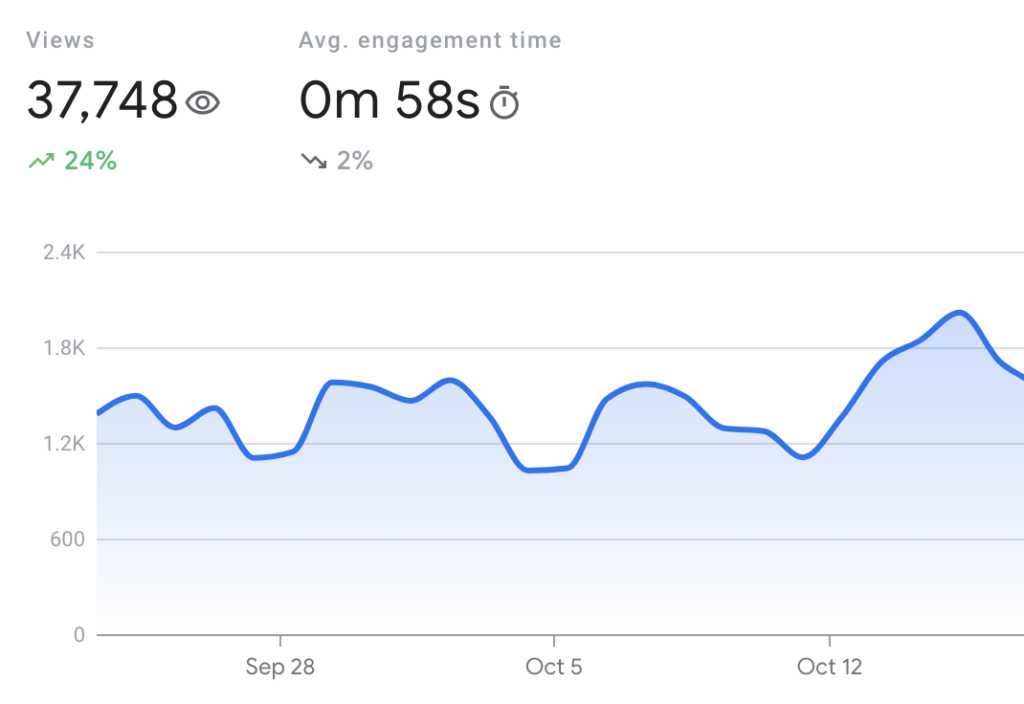
Remember to optimize your content for search engines by including relevant keywords and structuring your articles with descriptive headers and meta descriptions.
21. Attend Diverse Conferences for Fresh Ideas
As digital marketers, we often find ourselves surrounded by familiar concepts and strategies. While legal conferences like Mass Torts Made Perfect or the AAJ Convention are valuable, some of the most innovative ideas can come from venturing outside our usual circles. Attending diverse events helps break through the echo chamber of digital marketing, sparking creativity and fresh perspectives.
For instance, a personal injury firm might send team members to a UX/UI design conference to gain insights on improving client interactions on their website. Or they could attend a storytelling workshop to enhance their ability to present compelling client narratives. Even seemingly unrelated events, like a local TEDx conference or a marketing summit for the travel industry, can provide unexpected inspiration for new marketing approaches.
Morgan & Morgan exemplifies this approach by not only participating in legal conferences but also exploring events in technology, consumer behavior, and emerging media trends. This diverse exposure helps them stay ahead of the curve in their marketing strategies. By thinking outside the box and attending a variety of events, you can gain fresh perspectives that set your firm apart in the competitive personal injury landscape.
Remember, the goal is to challenge your thinking and find innovative ways to connect with potential clients. So don’t be afraid to explore conferences and events that, at first glance, might seem unrelated to personal injury law. The insights you gain could lead to your next breakthrough marketing idea.
22. Sponsor Local Events for Multi-Faceted Marketing Benefits
Sponsoring local events is a powerful strategy that offers personal injury law firms a wide array of marketing benefits, both offline and online. While building brand recognition and community goodwill are obvious advantages, the impact of event sponsorship extends far beyond these initial benefits.
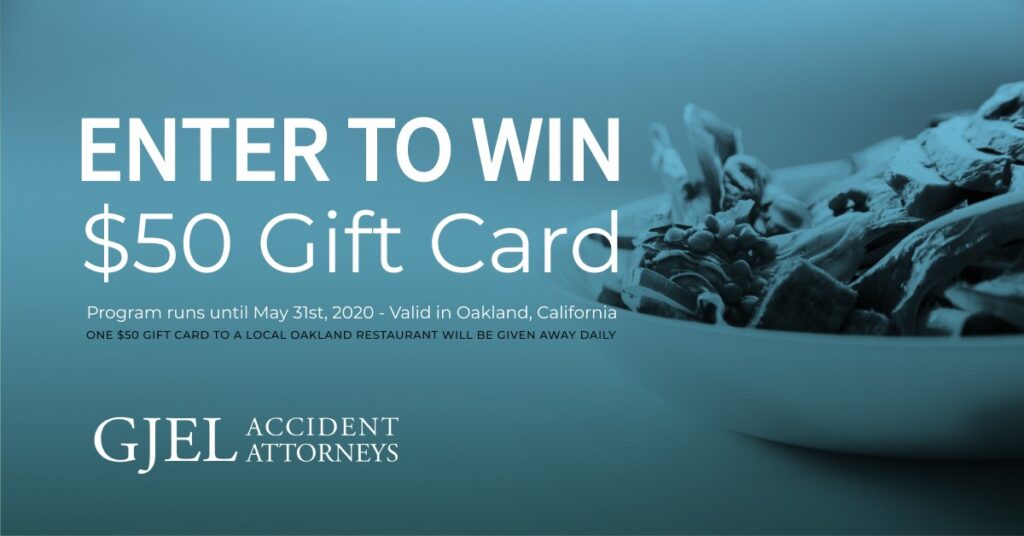
Firms like Fieger Law have successfully leveraged this approach by sponsoring charity runs and community sports events. For instance, they might sponsor a local 5K run for a children’s hospital, with their logo featured on all race t-shirts and promotional materials. However, the benefits of such sponsorships are much more comprehensive:
- Top-of-Mind Awareness: Regular presence at community events keeps your firm at the forefront of potential clients’ minds when they need legal services.
- Community Goodwill: Supporting local causes demonstrates your firm’s commitment to the community, fostering positive associations with your brand.
- SEO Benefits: Event sponsorships often result in backlinks from event websites and mentions in online promotional materials, boosting your firm’s search engine rankings.
- Media Exposure: Local events frequently attract media attention, providing opportunities for interviews and additional press coverage.
- Networking Opportunities: These events allow you to connect with other local businesses and community leaders, potentially leading to valuable partnerships or referrals.
- Content Creation: Sponsored events provide material for your firm’s blog, social media, and other marketing channels, helping to keep your content fresh and engaging.
- Employee Engagement: Involving your team in community events can boost morale and create a sense of pride in the firm’s community involvement.
- Targeted Marketing: By choosing events that align with your firm’s specialties (e.g., sponsoring a bicycle safety event if you handle many cycling accident cases), you can reach potential clients in a relevant context.
The key to maximizing these benefits is consistency. One-off sponsorships can be effective, but maintaining a regular presence at community events compounds these advantages over time. It’s also important to actively leverage each sponsorship opportunity — engage with attendees, share your involvement on social media, and follow up with connections made at the event.
Remember, while the immediate ROI of event sponsorships may not always be clear, the long-term benefits in terms of brand recognition, community standing, and diverse marketing opportunities make this a valuable strategy for personal injury law firms looking to establish a strong local presence.
23. Implement CRM and Email Marketing: Your Key to Sustainable Growth
In the competitive world of personal injury law, firms that neglect Customer Relationship Management (CRM) systems and email marketing are essentially starting from scratch each month, constantly fighting for a new list of potential clients. This approach is not only exhausting but also unsustainable in the long run.
A robust CRM system, coupled with strategic email marketing, is absolutely essential for law firms looking to build a stable, growing practice. Here’s why:
- Client Retention: CRM systems help you keep track of all interactions with potential and existing clients, ensuring no one falls through the cracks. This organized approach significantly improves client retention rates.
- Nurturing Leads: Not all potential clients are ready to engage your services immediately. Email marketing allows you to nurture these leads over time, providing valuable information and keeping your firm top-of-mind when they’re ready to proceed.
- Referral Generation: Past clients are a goldmine for referrals, but only if you stay in touch. Regular email communications remind them of your services, increasing the likelihood they’ll recommend you to friends and family.
- Cost-Effective Marketing: Compared to constantly seeking new clients through advertising, email marketing to an existing database is significantly more cost-effective.
- Personalized Communication: CRM data allows you to segment your email list and personalize communications, increasing engagement and conversion rates.
- Measurable Results: Email marketing provides concrete metrics, allowing you to refine your approach based on what resonates with your audience.
For example, Panish Shea & Boyle effectively leverages these tools by sending regular email newsletters with helpful legal tips and updates on settlements. Their monthly emails featuring a “Case of the Month” highlight and a “Know Your Rights” section keep their name in front of leads and past clients, fostering ongoing engagement.
Without a CRM system and email marketing strategy, firms miss out on these benefits and struggle to build a sustainable practice. They find themselves in a constant cycle of chasing new clients, rather than building a loyal base that generates referrals and repeat business.
Remember, the goal is not just to win cases, but to build lasting relationships. By implementing a CRM system and consistent email marketing, you create a foundation for sustainable growth, turning one-time clients into lifelong advocates for your firm.
Looking for a list of the top CRM’s? Check this out.
24. Start Organic SEO to Rank Nationally
Organic SEO strategies help build long-term visibility for your law firm’s website across broader geographical areas. Zanes Law has invested in national SEO by creating comprehensive practice area pages and blogs to rank for injury-related terms nationwide. For example, they might create an in-depth guide on “Nationwide Trucking Accident Statistics and Laws” to attract traffic from across the country.
Organic SEO just means we’re focusing on the free clicks vs the paid clicks.
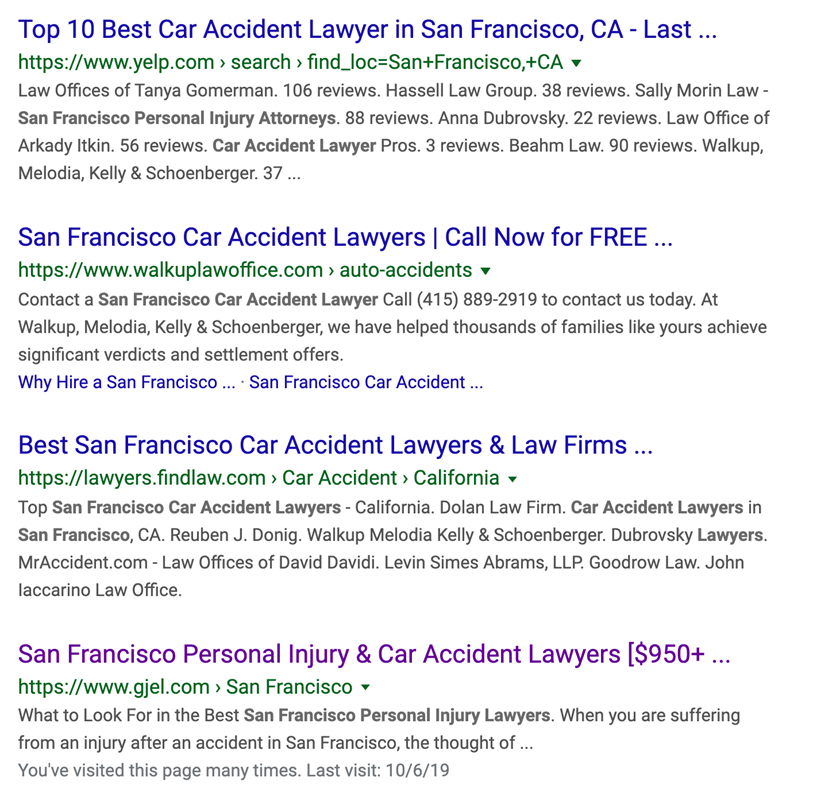
25. Start Marketing on One Social Media Platform
Focus on building a strong presence on one social media platform before expanding to others. 411 Pain has focused primarily on Instagram, sharing compelling video content that engages their followers and builds their brand.
They might post daily “Quick Legal Tips” videos, each under 60 seconds, covering various personal injury topics to boost engagement and followers.
26. Offer Free Consultations
Offering free consultations encourages potential clients to reach out and engage with your firm. Salvi Law prominently advertises their free consultation offer on their website and in ads, making it easy for prospective clients to connect.
For instance, they might feature a large “Schedule Your Free Consultation” button on every page of their website, reducing barriers for potential clients to get in touch.
27. Leverage Television Ads to Establish Brand Awareness
TV ads can help build brand awareness and visibility across a large audience. Morgan & Morgan use TV commercials to reach a broad audience, becoming one of the most recognizable names in personal injury law across the U.S. They might run a series of 30-second spots during prime-time local news broadcasts, featuring client testimonials and highlighting their track record of success.
28. Try Local Service Ads (LSA)
LSAs ensure your law firm appears at the top of Google searches for local services and helps generate qualified leads. Nunez Law Firm uses LSAs to get affordable, local leads from potential clients actively seeking legal services.
For example, they might set up an LSA campaign targeting “car accident lawyer” searches within a 50-mile radius of their office, paying only when a potential client calls or messages them directly through the ad.
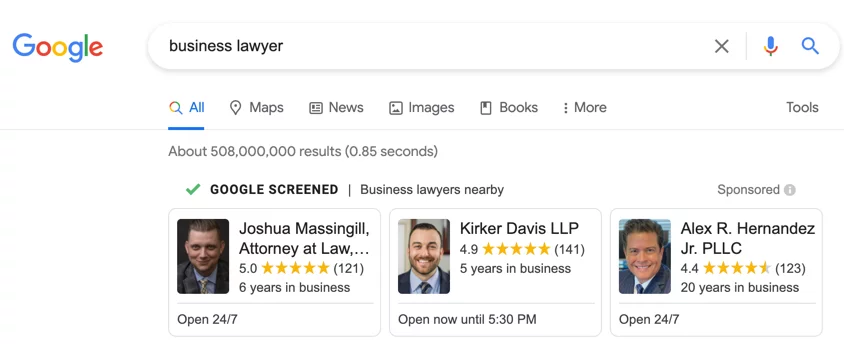
29. Commit to Long-Term Advertising for Optimal Results
While Google Ads can provide instant visibility for personal injury law firms, the biggest mistake many make is treating advertising as a short-term tactic. Firms like Farar & Lewis have found success by investing heavily in Google Ads, targeting high-intent keywords such as “Los Angeles car accident attorney.” However, the key to their success lies not just in the platform choice, but in their commitment to long-term advertising strategies.
It’s crucial to understand that the best results from advertising platforms, including Google Ads, typically emerge after 3+ months of consistent effort. Here’s why a long-term approach is essential:
- Learning Period: All ad platforms require time to learn which conversions work best for your firm. They need data to optimize ad delivery and targeting.
- Platform Incentives: Ad platforms are businesses too. They’re more likely to optimize performance for advertisers who demonstrate long-term commitment.
- Testing and Optimization: It takes time to test different ads, calls to action, and landing pages to find the most effective combinations.
- Audience Familiarization: Consistent presence helps build brand recognition among your target audience.
- Seasonal Variations: A year-long campaign allows you to understand and adapt to seasonal trends in personal injury cases.
To maximize your advertising ROI:
- Budget for a full year of advertising upfront
- Create specific ad campaigns for different practice areas with tailored landing pages
- Continuously test and refine your ads, targeting, and landing pages
- Monitor performance metrics closely, but avoid making drastic changes too quickly
- Be patient and allow time for the data to accumulate and inform your strategy
Remember, advertising platforms are sophisticated systems designed to deliver results, but they need time and data to work effectively. By committing to a long-term advertising strategy, you’re not just buying ad space – you’re investing in a learning process that will yield increasingly better results over time.
Evaluate your ROI on a quarterly or bi-annual basis, rather than monthly. This approach allows for a more accurate assessment of your advertising effectiveness and prevents knee-jerk reactions to short-term fluctuations.
In the competitive field of personal injury law, the firms that see the best results from their advertising efforts are those that treat it as a marathon, not a sprint. By giving your campaigns the time they need to optimize and perform, you’ll be well-positioned to outpace competitors who lack the patience for a long-term advertising strategy.
30. Commit to Social Media Advertising for Long-Term Success
While Google Ads can provide immediate results for personal injury lawyers, social media platforms like Facebook and Instagram require a different approach and a longer-term commitment. At Juris Digital, we’ve seen clients in the personal injury field achieve great results with social media advertising, but it’s crucial to understand that success doesn’t happen overnight.
The fundamental difference lies in user intent:
- Google Search Ads: Users are actively searching for answers or services, making them more likely to convert quickly.
- Social Media Ads: Users are passively scrolling through their feeds, not necessarily looking for legal services.
This difference in user behavior means that social media advertising requires a different strategy and more time to yield results. Here’s why committing to a long-term social media advertising strategy is essential:
- Brand Awareness: Unlike search ads, social media ads often serve as a first touchpoint. It takes time to build recognition and trust.
- Audience Building: Platforms like Facebook and Instagram allow you to create custom audiences based on engagement. The longer you advertise, the more refined these audiences become.
- Content Experimentation: What resonates on social media can be quite different from search ads. It takes time to find the right mix of visuals, copy, and calls-to-action.
- Retargeting Opportunities: As your campaign runs longer, you’ll build a larger pool of users to retarget, increasing the efficiency of your ads over time.
- Algorithm Learning: Social media platforms’ algorithms need time to optimize ad delivery to the most receptive audiences.
For example, Law Tigers effectively uses Facebook ads to target motorcyclists, but their success didn’t happen instantly. They likely spent months refining their approach, testing different ad creatives featuring motorcycles and riders, and fine-tuning ad copy that highlights their expertise in motorcycle accident cases.
To maximize your social media advertising ROI:
- Commit to at least a 6-month campaign to allow for proper testing and optimization
- Create content that adds value to your audience’s feed, rather than just promoting your services
- Use a mix of ad types (e.g., video, carousel, single image) to keep your content fresh and engaging
- Leverage retargeting to nurture leads over time
- Monitor engagement metrics closely and use these insights to refine your strategy
Remember, social media advertising is about playing the long game. While it may not drive immediate client sign-ups like Google Ads, it builds a foundation of brand awareness and trust that can lead to more sustainable growth over time.
At Juris Digital, we’ve observed that personal injury firms who commit to social media advertising for the long haul often see a compounding effect: as their brand recognition grows, so does their engagement rates and, ultimately, their client acquisition from these platforms.
By understanding the unique nature of social media advertising and committing to a long-term strategy, personal injury lawyers can tap into a powerful channel for building their brand and attracting clients who may not be actively searching for legal services, but will remember your firm when the need arises.
31. Harness the Power of Digital PR for Multiple Benefits
At Juris Digital, Digital PR is one of our most effective strategies for personal injury law firms. This approach not only enhances online visibility but also delivers a trifecta of benefits: high-profile mentions, direct case acquisitions, and significant SEO advantages.
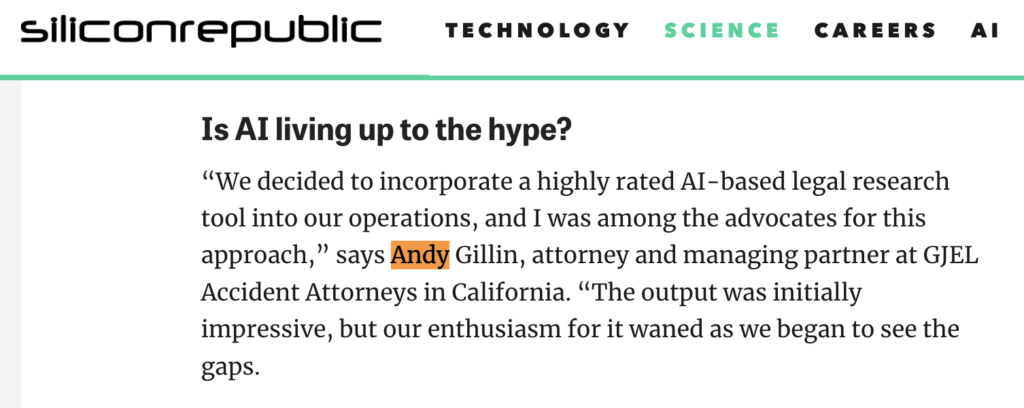
Here’s why Digital PR is a game-changer for personal injury attorneys:
- Major Publication Mentions: We regularly secure features for our clients in prestigious publications. These mentions elevate your firm’s profile and credibility among potential clients and peers alike.
- Direct Case Acquisition: High-visibility placements often lead directly to signed cases. When potential clients see your expertise showcased in trusted publications, it can be the deciding factor in choosing your firm.
- Authority Building: Consistent appearances in reputable sources position you as a thought leader in personal injury law, enhancing your professional reputation.
- SEO Benefits: Each mention typically comes with a valuable backlink. These links from high-authority sites significantly boost your website’s search engine rankings.
- Content Creation: Your media appearances can be repurposed into content for your website and social media, extending the value of each placement.
For example, we’ve helped firms like The Law Offices of Steven M. Sweat frequently appear in news articles and legal blogs. A typical strategy might involve:
- Contributing expert commentary to a popular legal news website on recent changes in personal injury law
- Authoring a guest post for a major business publication on workplace injury trends
- Providing insights for a local news story on traffic safety, positioning the firm as a community expert
Each of these appearances not only increases the firm’s visibility but also generates high-quality backlinks, enhancing their SEO profile.
To maximize the benefits of Digital PR:
- Develop a consistent outreach strategy to build relationships with journalists and editors
- Prepare a range of topics where you can offer expert insights, aligned with current trends and issues in personal injury law
- Be ready to respond quickly to media requests – timeliness is often crucial in securing placements
- Leverage each appearance across your other marketing channels to amplify its impact
At Juris Digital, we’ve seen firsthand how a well-executed Digital PR strategy can transform a personal injury firm’s online presence. It’s not uncommon for our clients to see substantial increases in organic search traffic, coupled with a steady stream of high-quality leads, directly attributable to their media appearances.
Remember, effective Digital PR is an ongoing process. The cumulative effect of consistent media presence builds over time, creating a powerful synergy between your brand authority, SEO performance, and client acquisition efforts.
32. Engage Audiences with Instagram Reels
While TikTok has gained significant attention, Instagram Reels offers a powerful alternative for personal injury lawyers looking to tap into short-form video content. Reels provides an opportunity to reach a broader, more diverse audience directly on a platform where many potential clients already spend their time.
Here’s why Instagram Reels can be effective for personal injury lawyers:
- Wider Demographic Reach: Instagram’s user base spans a broader age range than TikTok, potentially connecting you with more potential clients.
- Integration with Existing Strategy: If you’re already using Instagram, Reels seamlessly integrates with your current content strategy.
- Professional Context: Instagram’s environment often feels more professional than TikTok, which can be beneficial for legal content.
- Discoverability: Reels appear on the Explore page, increasing your chances of reaching new audiences.
- Versatile Content Options: From educational snippets to behind-the-scenes glimpses, Reels offer various ways to showcase your expertise and personality.
For example, a personal injury lawyer could create a series of 15-30 second Reels covering topics like:
- “5 Things to Do Immediately After a Car Accident”
- “Understanding Your Rights in a Slip and Fall Case”
- “How to Document Injuries for a Personal Injury Claim”
To maximize the impact of your Reels:
- Use trending audio and effects to increase engagement, but ensure they’re appropriate for your professional image.
- Maintain a consistent posting schedule to build an audience.
- Incorporate text overlays to make your content accessible and engaging even without sound.
- Use relevant hashtags to improve discoverability.
- Cross-promote your Reels on your Instagram Stories and other social media platforms.
Remember, the key to success with Reels is to balance informative content with an engaging, approachable delivery. While you’re sharing valuable legal information, don’t be afraid to show some personality. This human touch can make complex legal concepts more digestible and help potential clients feel more comfortable reaching out to your firm.
By consistently creating valuable, engaging Reels, you can build trust with your audience, showcase your expertise, and potentially attract new clients who might not have found your firm through traditional marketing channels.
33. Respond to Client Questions and Pain Points on Reddit
Reddit, with its diverse communities and high Google visibility, offers a unique opportunity for personal injury lawyers to showcase their expertise and attract potential clients. Many Reddit threads rank highly in Google search results, making your contributions potentially visible far beyond the platform itself.
Key strategies for effective Reddit engagement:
- Identify relevant subreddits like r/legaladvice or local community subreddits.
- Provide helpful, non-promotional responses to legal questions.
- Share insights on common personal injury issues and misconceptions.
- Use your professional knowledge to clarify complex legal topics for laypeople.
- Be consistent in your participation to build credibility within the community.
Remember, the goal is to be genuinely helpful rather than overtly promotional. By consistently providing value, you can establish yourself as a trusted resource, potentially leading to inquiries from Reddit users facing legal challenges.
Always adhere to Reddit’s rules and ethical guidelines for lawyers when participating. With thoughtful engagement, Reddit can become a powerful tool for connecting with potential clients and boosting your online visibility.
34. Demonstrate Your Injury Experience
Highlight your experience with personal injury cases in your marketing, showcasing your results. Hipskind & McAninch use case studies and testimonials on their website to demonstrate their expertise in high-stakes personal injury cases.
They might feature a detailed breakdown of a recent successful case, explaining the challenges faced and how they secured a favorable outcome for their client.
PS: These should be used in your Storybrand drip campaigns.
35. Ensure You Have a Modern and Optimized Personal Injury Website
Your website should reflect a modern, professional image, with easy navigation, fast load times, and clear CTAs. Jim Adler & Associates keeps their website fresh with a clean design, mobile optimization, and a prominent free consultation form.
They might implement a chatbot feature to engage visitors immediately, answering basic questions and scheduling consultations 24/7.
Maybe even consider an AI chatboat as they’re getting pretty good now!
36. Leverage Relevant Lawyer Directories for Credibility and Traffic
Being listed on top legal directories is more than just a checkbox for personal injury lawyers—it’s a powerful tool for driving traffic, building credibility, and generating leads. Directories like Avvo, Justia, FindLaw, and Martindale-Hubbell often rank highly in search results, making them valuable channels for potential clients to discover your firm.
Key benefits of directory listings:
- Increased Visibility: Many directories have strong domain authority, helping your firm appear in search results for relevant queries.
- Credibility Boost: Presence on respected directories can enhance your firm’s perceived trustworthiness.
- Client Reviews: Most directories allow client reviews, providing social proof to potential clients.
- Backlink Opportunities: Directory listings often include links to your website, potentially boosting your SEO.
For example, Bisnar Chase effectively utilizes directories like Avvo and Martindale-Hubbell to enhance their online presence. Their strategy likely includes:
- Creating comprehensive profiles with detailed information about practice areas, attorneys, and the firm’s history
- Regularly updating profiles with recent case results and accolades
- Encouraging satisfied clients to leave reviews on these platforms
- Contributing articles or answers to legal questions, where platforms allow
To maximize the impact of your directory listings:
- Choose Wisely: Focus on reputable directories relevant to personal injury law and your geographic area.
- Complete All Fields: Provide as much information as possible in your profiles to stand out.
- Consistency is Key: Ensure your firm’s information is consistent across all directories and your website.
- Showcase Expertise: Where possible, contribute content or answer questions to demonstrate your knowledge.
- Monitor and Respond: Regularly check your listings for new reviews or questions, and respond promptly.
- Track Performance: Use analytics to understand which directories drive the most valuable traffic to your website.
Remember, while directories can be powerful tools, they should be part of a broader digital marketing strategy. Combine your directory presence with a strong website, content marketing, and other digital initiatives for the best results.
37. Create Custom Landing Pages for Each Practice Area
It’s SEO 101, yet surprisingly often overlooked: creating custom landing pages for each practice area is a fundamental strategy that can dramatically boost your firm’s search visibility and conversion rates. In the world of personal injury law, there are countless niche-specific terms that potential clients are searching for, and each represents an opportunity to capture valuable traffic.
Why this strategy is crucial:
Higher Conversion Rates: Pages tailored to specific needs tend to convert better as they directly address the visitor’s particular situation.
Targeted Keyword Optimization: Each practice area has its own set of specific keywords. Custom pages allow you to optimize for these niche terms without diluting your main pages.
Improved User Experience: Visitors looking for specific information (e.g., “motorcycle accident lawyer”) will find exactly what they need, increasing engagement and conversion rates.
Local SEO Benefits: You can tailor content to include location-specific information, improving your visibility in local searches.
Increased Organic Traffic: By targeting a wider range of specific terms, you can capture traffic that broader, generalized pages might miss.
38. Boost Local Visibility with Business Directory Listings
While legal-specific directories are valuable, don’t overlook the power of general local business directories. These platforms can significantly enhance your firm’s local SEO and visibility, connecting you with potential clients in your immediate area.
Key benefits of local business directory listings:
- Improved Local SEO: Many of these directories have high domain authority, helping your firm appear in local search results.
- NAP Consistency: Maintaining consistent Name, Address, and Phone number (NAP) across directories boosts your local search rankings.
- Client Reviews: Most directories allow client reviews, providing social proof to potential local clients.
- Increased Online Presence: Each listing is another opportunity for potential clients to discover your firm.
For example, GJEL Accident Attorneys effectively utilize local business directories to enhance their local online presence. Their strategy likely includes:
- Creating and maintaining listings on platforms like Google My Business, Yelp, and Yellow Pages
- Ensuring consistent and accurate information across all directory listings
- Encouraging satisfied local clients to leave reviews on these platforms
- Regularly updating listings with current information, photos, and services
To maximize the impact of your local business directory listings:
- Start with Google My Business: This is crucial for local SEO and should be your first priority.
- Target High-Value Directories: Focus on well-known platforms like Yelp, Yellow Pages, and BBB.
- Seek Out Local Directories: Look for city-specific or regional business directories.
- Maintain Consistency: Ensure your firm’s NAP information is identical across all listings.
- Provide Rich Information: Include photos, business hours, services offered, and other relevant details.
- Encourage and Respond to Reviews: Actively seek client reviews and respond to them promptly and professionally.
- Keep Information Current: Regularly audit and update your listings to reflect any changes in your practice.
Remember, while legal-specific directories are important, local business directories can help you capture potential clients who might not be specifically searching for a lawyer yet. For instance, someone looking for local businesses after an accident might come across your firm on Yelp or Google My Business.
By strategically leveraging local business directories, personal injury law firms can improve their local SEO, increase their visibility to potential clients in their area, and build trust through consistent online presence and client reviews.
39. Connect with Clients via Social Media
Stay top-of-mind by engaging with potential clients on platforms like Facebook, LinkedIn, and Instagram. Dolman Law Group uses Facebook to share client success stories and answer common legal questions, building engagement and trust. They might run a weekly “Ask a Lawyer” session on their Facebook page, where followers can submit questions about personal injury law to be answered live.
40. Start an Email Marketing Campaign
Use email campaigns to nurture leads and keep in touch with previous clients. Panish Shea & Boyle LLP sends regular legal updates and blog content to its email list, keeping potential clients informed and engaged.
They might create a monthly newsletter featuring recent case wins, changes in personal injury law, and safety tips, encouraging recipients to forward the valuable information to friends and family.
How Juris Digital Uses StoryBrand and SEO to Help Personal Injury Attorneys Sign More High-Value Cases
At Juris Digital, we are more than just an SEO agency—we are a partner in helping personal injury law firms connect with their ideal clients and grow their practice. While SEO is critical for visibility, getting to the top of search results is only the first step. To convert those visitors into high-value clients, your message must be clear, compelling, and client-focused.
That’s why we combine SEO expertise with the StoryBrand framework to help personal injury attorneys not just rank higher, but communicate better. Ranking at the top of Google isn’t enough if your potential clients don’t feel understood. Using StoryBrand, we ensure your website, content, and messaging speak directly to the challenges your clients are facing, positioning your firm as the guide they need to navigate their legal journey.
We help you tell a story that resonates—one where your clients are the heroes, and your firm is the trusted advisor guiding them to success. From optimized SEO strategies to fine-tuning your messaging, we make sure that every aspect of your digital presence aligns with what your clients are looking for.
At Juris Digital, we don’t just focus on getting you more traffic; we focus on getting you the right traffic and converting that traffic into high-value cases. By using SEO to drive visibility and StoryBrand to craft messaging that engages, we empower your law firm to attract and retain clients who trust you to deliver real results. Let us help you create a strategy that’s not only optimized for search engines but also optimized for client trust and growth.
